Postpublished at 10:43 BST 21 August 2023
For live coverage of the sentencing of Lucy Letby, please click here
Nurse Lucy Letby has been found guilty of murdering seven babies who were being looked after on a neonatal ward
The murders happened at the Countess of Chester Hospital between June 2015 and June 2016
Letby, 33, is the UK's most prolific killer of babies in modern times
She has also been found guilty of attempting to murder another six babies, and will be sentenced on Monday
She was found not guilty of two counts of attempted murder and the jury were undecided on a further six counts of attempted murder
The lead consultant at the neonatal unit tells the BBC hospital bosses failed to investigate allegations against Letby - the government has ordered an independent inquiry
Police are reviewing the admissions of 4,000 babies to hospitals where Letby worked - but stress they are not investigating all 4,000
You can watch Lucy Letby: The Nurse Who Killed at 20:00 BST on BBC One and BBC iPlayer
Edited by Owen Amos and Francesca Gillett
For live coverage of the sentencing of Lucy Letby, please click here
Thank you for following our live coverage.
This page was brought to you by Jasmine Taylor-Coleman, Owen Amos, Jamie Whitehead, Laura Gozzi, James Harness, Thomas Mackintosh, Marita Moloney and Francesca Gillett.
All the latest stories we've published on this case can be found here.
Francesca Gillett
Live reporter
Lucy Letby today was named the worst serial killer of children in modern UK history, as she was found guilty of murdering seven babies and trying to kill six others.
The 33-year-old was a nurse in the neonatal unity at the Countess of Chester Hospital when she committed her crimes between 2015 and 2016. She was found not guilty on two attempted murder charges, and the jury were hung on six other counts.
The reaction to the case has been extensive:
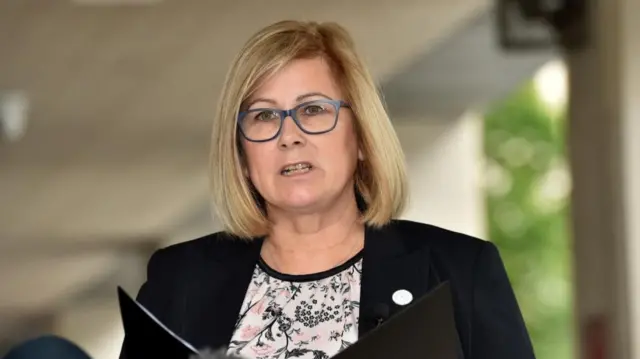 Image source, PA Media
Image source, PA MediaThe statement was read out by family liaison officer, Janet Moore
Once all the verdicts were in and could be reported, the families of Letby's victims released a joint statement, which was read outside court earlier.
Dan O'Donoghue
At Manchester Crown Court
During the trial, we heard, often in harrowing detail, how previously stable babies collapsed and died despite the desperate efforts of doctors and nurses to save them.
Much of the case centred on at times hard to follow dense medical detail, with thousands of documents shown to the jury detailing the blood gas levels, heart rate and respiratory rates of these infants, with X-rays, feeding charts, nursing and doctors’ notes also produced in evidence.
But what really cut through was the humanity in this case. Clinicians fought back tears in the dock describing how they battled to save children, and parents of the 17 alleged victims spoke about the truly unimaginable pain they suffered as they saw their children deteriorate.
There was also emotion from Letby, who the defence repeatedly said was completely innocent of the crimes alleged.
In the witness box, the former nurse told how her life had been destroyed, pushing her to consider suicide after these allegations were levelled at her and she was removed from front-line nursing duties in 2016.
DCI Nicola Evans says the babies will "forever be in our hearts".
After the verdicts Cheshire Constabulary gave a statement outside the Manchester Crown Court, which you can watch again above. DCI Nicola Evans said the trial had been a "long and emotional journey" for the police and the victims' families.
Former chief crown prosecutor for the North West of England, Nazir Afzal, says it's “hugely disappointing" the inquiry is non-statutory - which means it has fewer legal powers and cannot force people to testify.
Speaking to Radio 4's PM programme, Afzal said “you have to compel people... I really don’t think a non-judicial inquiry has the powers to hold people to account, which is important here.
"People need to be held to account for their failures,” he continued.
Meanwhile Lord Bichard, who chaired the inquiry into the murders of Holly Wells and Jessica Chapman, also says he's surprised it's non-statutory. Earlier the government defended this, saying a non-statutory inquiry will be quicker “and more flexible to answer the questions that need to be answered”.
Lord Bichard says the bereaved families should "have a chance to meet and question the proposed chair".
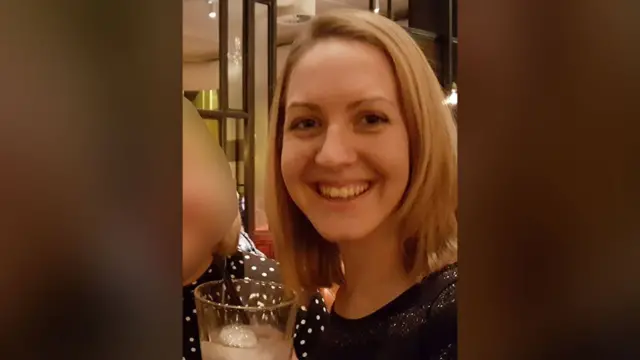 Image source, Unknown
Image source, UnknownBefore June 2015, there were about two or three baby deaths a year on the neonatal unit at the Countess of Chester Hospital. But in the summer of 2015, something unusual was happening.
In June alone, three babies died within the space of two weeks. The deaths were unexpected, so Dr Stephen Brearey, the lead consultant at the neonatal unit, called a meeting with the unit manager, Eirian Powell, and the hospital's director of nursing Alison Kelly.
"We tried to be as thorough as possible," Dr Brearey says. A staffing analysis revealed Lucy Letby had been on duty for all three deaths. "I think I can remember saying, 'Oh no, it can't be Lucy. Not nice Lucy,'" he says.
BBC Panorama and BBC News have been investigating how nurse Lucy Letby was able to murder and harm so many babies for so long.
You can watch Lucy Letby: The Nurse Who Killed at 20:00 BST on BBC One and BBC iPlayer, or click play at the top of this page.
 Laura Foster
Laura Foster
Health reporter
A non-statutory public inquiry is going to be held following this case. It’s going to examine what happened and what lessons can be learned, to stop such awful crimes from happening again.
A non-statutory public inquiry is set up by the government (in this case the UK one which is responsible for healthcare in England) but it doesn’t have the power to summon evidence or witnesses as can be done in a statutory one – such as the UK Covid-19 public inquiry.
However, information is still usually shared when it’s needed to keep people safe from serious harm or death. That could certainly be a factor in this inquiry.
Other examples of this type of inquiry include the one set up following the sentencing of Sarah Everard’s killer and the Chilcot Inquiry into the UK’s involvement in the Iraq War.
The UK's health watchdog has issued a statement, saying the Lucy Letby case is "almost without parallel".
“It is one of the darkest crimes ever committed in our health service," says the Parliamentary and Health Service Ombudsman, Rob Behrens
He says evidence in the trial shows staff "repeatedly raised concerns and called for action" but "it seems that nobody listened and nothing happened", and "more babies were harmed and more babies were killed".
"Those who lost their children deserve to know whether Letby could have been stopped and how it was that doctors were not listened to and their concerns not addressed for so long."
He calls for "significant improvements to culture and leadership across the NHS so that the voices of staff and patients can be heard, both with regard to everyday pressures and mistakes and, very exceptionally, when there are warnings of real evil".
Warning: Contains distressing testimony
We can now show you an interview with the parents of twins who were two of Lucy Letby's victims.
You can watch the full interview on Lucy Letby: The Nurse Who Killed at 20:00 BST on BBC One and BBC iPlayer.
'Lucy Letby is a hateful human being' - twins' parents
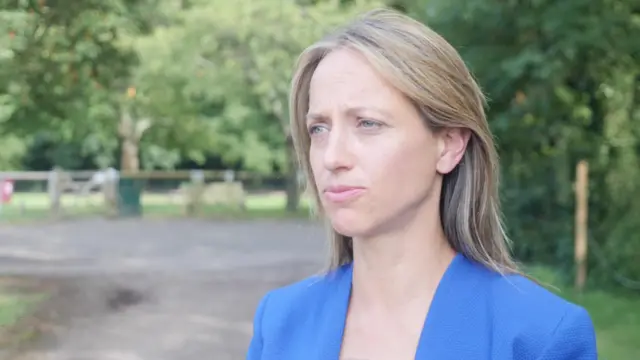
A few moments ago we heard from the UK's care minister Helen Whately, who joined those expressing sympathy to the babies' families and staff members.
Talking about the government inquiry, Whately said: "The important thing here is something like this must never happen again and of course the NHS must learn lessons.
"One of the things here is to make this can be done at pace, with action to be taken quickly", she continued, when asked why the government opted for a non-statutory inquiry which has fewer legal powers. "A non-statutory inquiry can happen more quickly and be more flexible to answer the questions that need to be answered."
Whately says one thing she thinks should be looked into is why doctors weren't listened to when they raised concerns.
A mother - who also worked at the Countess of Chester Hospital as a nurse - has alleged that Lucy Letby tried to harm her baby in revenge for a complaint she made about her.
Lynsey Artell spoke to Sky News earlier, external and said she and her husband felt their premature son was doing well on the neonatal unit. She claims Letby overheard them talking and told them: “I don't like parents getting their hopes up because we never know what could happen at this stage."
This prompted Artell to make a complaint. She then alleges that a day later, when she left her baby son for a moment to get coffee, his insulin levels rose - injecting insulin was one the methods Manchester Crown Court heard Letby had used to kill her victims.
Lynsey Artell’s baby did recover and was discharged from hospital. Police investigated twice but never brought any charges.
Dr Nigel Scawn of the Countess of Chester hospital says lessons will be learned.
Here's the clip in full of the medical director at Countess of Chester Hospital reacting earlier to the verdicts.
Dr Nigel Scawn says the NHS trust is "extremely sorry" Lucy Letby's crimes were committed at the hospital - and that it's had a profound effect on staff.
This has been a truly landmark case and there's been plenty of reaction since Lucy Letby's convictions came through at about lunchtime today. If you're just joining us, here's a quick recap:
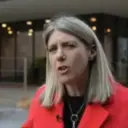 Judith Moritz
Judith Moritz
Text messages sent by Lucy Letby in the hours after she murdered babies on a neonatal unit were a key part of the evidence against her.
The texts show how she offered to work extra shifts on the neonatal intensive therapy unit. And, as her murders mounted, they also reveal how Letby reacted as the net of suspicion closed in on her.
The morning after murdering Baby D, Letby sends a message to a colleague:
Letby: We lost Baby D
Colleague: What!!!! But she was improving. What happened.
The conversation continues later:
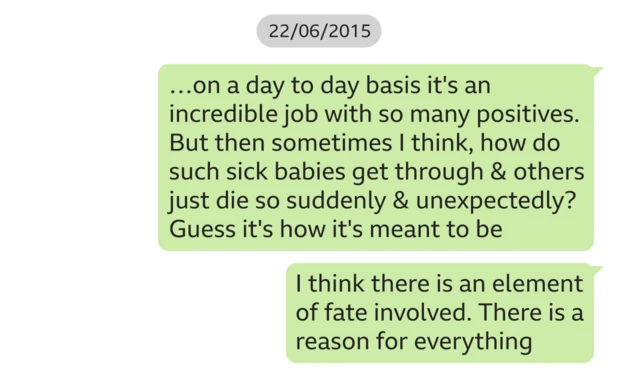
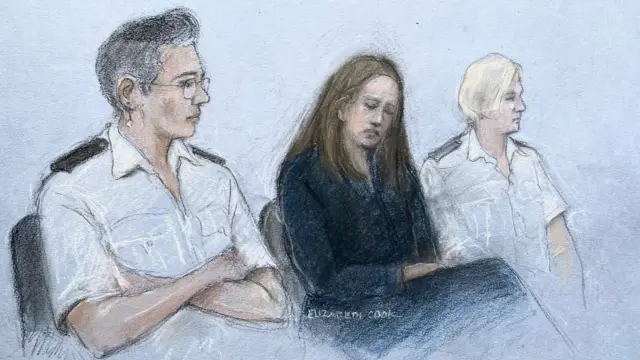 Image source, PA Media
Image source, PA MediaLucy Letby appeared in the dock several times since the start of the trial. She was not present today as the verdicts were delivered.
On two occasions earlier this month, she was in the courtroom and sobbed loudly or cried with her head bowed.
But she was last present in court on the morning of 16 August. It is believed she has at times been in the building during proceedings, but refused to come into the courtroom and instead stayed in the cells.
It is unclear whether Letby will be present on Monday morning for her sentencing. The Ministry of Justice has said that the Lord Chancellor has been clear that he wants "victims to see justice delivered and for all those found guilty to hear society’s condemnation at their sentencing hearing".
“Defendants can already be ordered by a judge to attend court, with those who fail facing up to two years in prison for contempt of court."
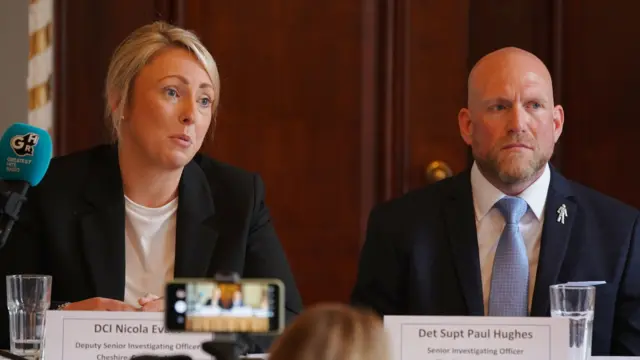 Image source, PA Media
Image source, PA MediaThe senior investigating officer in the six-year probe that led to Lucy Letby today being found guilty of murder has released a statement about how the investigation unfolded.
"We had to go right back to the start, keeping an open mind and being careful not to draw any conclusions," said Det Supt Paul Hughes.
"The last thing we expected to find was a suspect responsible for these deaths and non-fatal collapses. It was a long, drawn-out process but no stone was left unturned. We had to do it right - not rush it.
"We had to deal with this as 17 separate investigations - we are normally used to dealing with one murder or attempted murder investigation at a time let alone something on this scale.
"What started out as a team of eight quickly increased and, at the height of the investigation, featured almost 70 officers and civilian staff working together.
"Turning up at the home of a family who have lost a baby, grieved for their loss and are trying to move on from that is difficult enough, but having to tell them that someone who was meant to be caring for their little one could ultimately be responsible for their death - is not an easy task."
England's most senior nurse, Dame Ruth May, calls Letby's crimes "appalling" and "a terrible betrayal of the trust placed in her".
“Colleagues within the nursing profession and across the health service have been shocked and sickened to learn what she did, actions beyond belief to the nurses and staff working so hard to save lives and care for patients," says Dame Ruth, chief nursing officer for England.
Dame Ruth says the NHS is fully committed to doing everything to stop anything like this happening again, and she fully welcomes the independent inquiry. “On behalf of all of us I would like to express our profound apologies to the families for all they have been through."
 Judith Moritz
Judith Moritz
North of England Correspondent
At 10 months, the Lucy Letby trial is thought to be Britain’s longest ever murder case.
Its length, and the complexity of the evidence have made it heavy going for all involved.
Most especially, of course, for the parents of the babies.
Some came to court to give harrowing accounts of their experiences, and many sat through hours of upsetting testimony from witnesses.
All remained dignified throughout, and the atmosphere in the courtroom was intense as the verdicts started to come in over the course of several hearings. Some couples held hands, others clutched babies’ toys.
It was striking that Letby’s seat in the dock remained empty at the end, and her parents - who’ve been present throughout - were also absent then.
The judge praised the jurors for their service, and acknowledged that the gruelling process has been difficult for them.
They deliberated for more than 100 hours before confirming that they were unable to deliver any more verdicts.
It was clear that some of them were emotional at the end too. They will be offered support, if they want it, to help them come to terms with the experience of sitting on this jury.